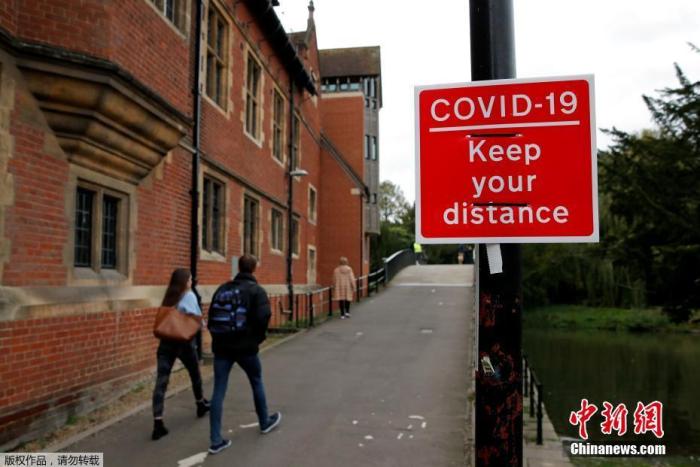China News Service, October 28. According to the British Broadcasting Corporation (BBC) Chinese website on the 27th, British researchers said that after being infected with the new crown virus, the level of antibodies in the infected person will "rapidly decrease."
The Imperial College London research team found that between June and September, the number of people who tested positive for antibodies dropped by 26%.
According to reports, the results of this study are preprints and have not yet been reviewed by peers.
Data map: On October 12, local time, Cambridge, England, signs reminding people to maintain social distancing hung beside the road.
Antibodies are a key part of the body's immune defenses and can prevent viruses from entering human cells.
Researchers say that the immune system of the infected person seems to be weakening and is at risk of multiple infections with the new coronavirus.
The data sample for this study comes from the results of two rounds of antibody tests on more than 360,000 English people.
The first round of testing is between the end of June and the beginning of July. About 60 out of 1,000 people have antibodies.
But in the latest set of tests in September, only 44 out of 1,000 people tested positive for antibodies.
This indicates that the number of people with antibodies dropped by at least a quarter from summer to autumn.
Researchers randomly selected volunteers of different ages and genders in the UK, and asked them to self-test at home for antibodies.
Professor Helen Ward said: "The immunity of (volunteers) has declined rapidly. It is only three months before our first round (testing), and the number of people with antibodies has dropped by 26%."
Compared with younger age groups, the number of people over 65 who have lost antibodies has a greater decline, and asymptomatic people have a greater decline than patients with obvious symptoms.
The number of healthcare workers with antibodies is still relatively high, and researchers believe this may be due to their regular exposure to the virus.
According to reports, antibodies will adhere to the surface of the new coronavirus to prevent it from invading human cells and attacking the remaining immune system.
The impact of losing antibodies on immunity is uncertain.
T cells and other components of the immune system may also play a role in fighting the new coronavirus.
There are very few cases of secondary infection with the new coronavirus worldwide.
But the researchers warned that this may be due to the fact that human immunity only began to weaken after the period of high infection rates in March and April.
Researchers say their findings will not dash hopes for vaccine development.
Professor Graham Cook said: "After the first wave of the epidemic, most of the people in the UK did not develop protective immunity. The demand for vaccines is still great, and the data from this study has not changed this reality."
Professor Jonathan Bauer of the University of Nottingham in the United Kingdom commented on the findings: “This study confirms people’s suspicions that antibodies will change over time, especially in high-risk elderly groups, where antibody levels will decline.”
But he said that a better understanding of "protective immunity" is still important.
Professor Eleanor Riley of the University of Edinburgh said that it is too early to think that immunity will not last, but "the data does make people worry that the antibodies produced by the new crown virus, like other seasonal flu, can only exist for a short time."

